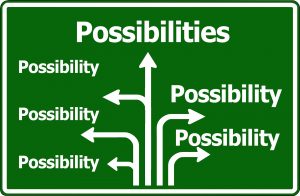13 Get More for Your Buck!
Woodrow Hoover; Macy Ramirez; and Francisco Torres
$$ How do I get more bang for my buck? $$
Learning how to save money is part of becoming an adult. Understanding your individual needs for either just yourself or others can be a survival tool to help you grow as an adult. Using different resources and doing your research is necessary to save money. Below are just a few!
Eat at home!
By eating at home, you can plan meals. Cook in bulk, freeze it to make sure you always have food available. There are many resources and recipes from other individuals on the internet who meal prep that can help. It is easier to keep track of calories when you prepare your meals. You have all the information on what you put into your food, therefore knowing exactly what you are putting into your body. The cost of cooking for the whole family can be equivalent to what you might spend at a restaurant just for yourself. Restaurants can seem like an easy way out since others are prepping the food for you, but the costs eventually add up and hurt your bank account. Restaurant food tends to have more preservatives and ingredients such as more sugar, salt, etc., but if you are making your own food, you have control over what goes into your meals!
Look for food on sale!
Review store ads for their weekly deals. Shop at multiple stores as long as they are close to each other. Many stores offer sales where you buy one get one free take advantage of those deals. Make sure to consider shelf life, find out which items can stock up without spoiling, and don't overstock up on produces you might not get a chance to use this time around. Once at check-out, look at the lower bottom of your receipt, where you typically find a percentage of the amount you saved on your purchases. Make it a game to save 30% or more when you grocery shop. Saving money doesn't need to be boring or a chore. Signing up for different apps or mail-in coupons can help send coupons right to your fingertips. With the rise of technology, grocery stores have made their own apps to make an account and earn points or even coupons just for using the app.

Try substitutes!
Be open-minded to different outcomes. A recipe may call for 1-pound of beef, but the meat isn't on sale. Switch it up with a pound of Turkey or Chicken. Finding different ingredients to substitute with may help save money and even make the meal healthier. Researching what different ingredients can help substitute others will help you better understand and learn more about cooking. Try to find substitutes for your own tastes, for example, if you prefer sweeter tastes over saltier tastes or vice versa. The possibilities are endless when you learn new and different options.

Make a list!
Before you head to the grocery store, please review what you already do have and necessarily need, create a list, and stick to it! You will be more likely to stick to your budget and less tempted to buy items that will add up quickly. Make sure to make a point of which items are more necessary than others. If you need a product yet, you can wait until there is a sale for said product. You can make a list on your phone or paper if you prefer a physical copy to help you keep track and remember what you need. It can be easy to sway away from what you actually need at home.

Buy Generic!
Sometimes, the big-name brand arent the best option. Try looking for generic or store-branded items to save more money. Just because it's expensive does not make the quality better. Name brands generally have the same ingredients as lesser-known brands. Some consumers may even find that the generic brands taste and perform just as well as big-name brand products. Most of the time, you are paying for the name and not the quality.
Don't go, hungry!
When it's time to head to the grocery store, make sure your stomach is not empty. Statistics show when shopping hungry, you will end up with impulse items not on your list. This is when the saying "my eyes were bigger than my stomach" comes into play. It is easy when you see the food in front of you to grab what looks and sounds good, which is everything when you are hungry.
Make Conscious decisions!
While it may be easier to buy the precooked, preseasoned chicken, it is more than likely that the preserved chicken already made costs more than raw chicken you can cook on your own. People tend to have a time is money mentality but in reality, saving time by buying pre-made food costs a lot more than cooking the chicken in bulk and having it last throughout the week for leftovers. Most of the time, the pre-made foods have excess amounts of sodium and preservatives to have the chicken made to last in the fridge or freezer. Also, note whether you will finish the food and not let it go to waste. Food waste is, unfortunately, prevalent in America. You wouldn't throw away money, so would you throw away food that you paid for? Using the leftovers to add to different recipes can help you save a significant amount of money. It can also be fun, as you may have to get creative and try different cooking combinations.
Check to see which Fruits and vegetables are in season!
Checking the store's weekly ads or simply googling what produce is in season can help you plan what meals you can cook with the in-season produce you buy. Produce tends to be significantly cheaper when they are in season. For example, in autumn, apples, pumpkins, and squash are all in surplus; therefore, grocery stores tend to mark them down or have deals on just those produce. Additionally, since the foods are in season, they will taste significantly better as out of season, foods tend to be less flavorful. You will not get the full capacity of flavor you can get from in-season foods.
Buy in Bulk!
Buying in bulk is another way to save money! Shopping at stores like Costco or Sams club, which are large, membership, warehouse stores, can be a tool to buy foods you know you will consume for long periods of time, for less money. Buying a large box of granola bars that you know you eat every day as a snack versus buying multiple little boxes of the same granola bars can be significantly cheaper in the price comparison. Not only is it cheaper, but it can be less wasteful for the environment as there is less packaging. It can also save you more time as the grocery store's constant trips may not be needed if you are already stocked up on what you need. This also saves you gas money, a win-win!
Properly store your food!
As stated earlier, food waste is prevalent in American households. Make sure you are storing your foods properly. Some produce last longer if refrigerated and some do not. Everyone stores their foods differently, so it can be difficult to know which way is right and wrong. Searching for a scientific answer would be best as it can be proven whether or not storing certain foods differently can add longevity to their lifespan. According to Picincu, apples release a gas called "ethylene" that can overripen other fruits such as bananas, two fruits commonly found together in a fruit bowl. Food research can help you save money!
What Fruits Shouldn't Be Stored Next to Each Other? (n.d.). Retrieved December 12, 2020, from https://www.livestrong.com/article/523091-what-fruits-shouldnt-be-stored-next-to-each-other/
Media Attributions
- opportunity-396265_1920 © Image by Gerd Altmann is licensed under a Public Domain license
- shopping-list-749278_1920 © Image by Alexas Fotos is licensed under a Public Domain license
- stamp-1660856_1920 © Image by Gerd Altmann is licensed under a Public Domain license
- ad-70507_1920 © Image by Gerd Altmann is licensed under a Public Domain license


